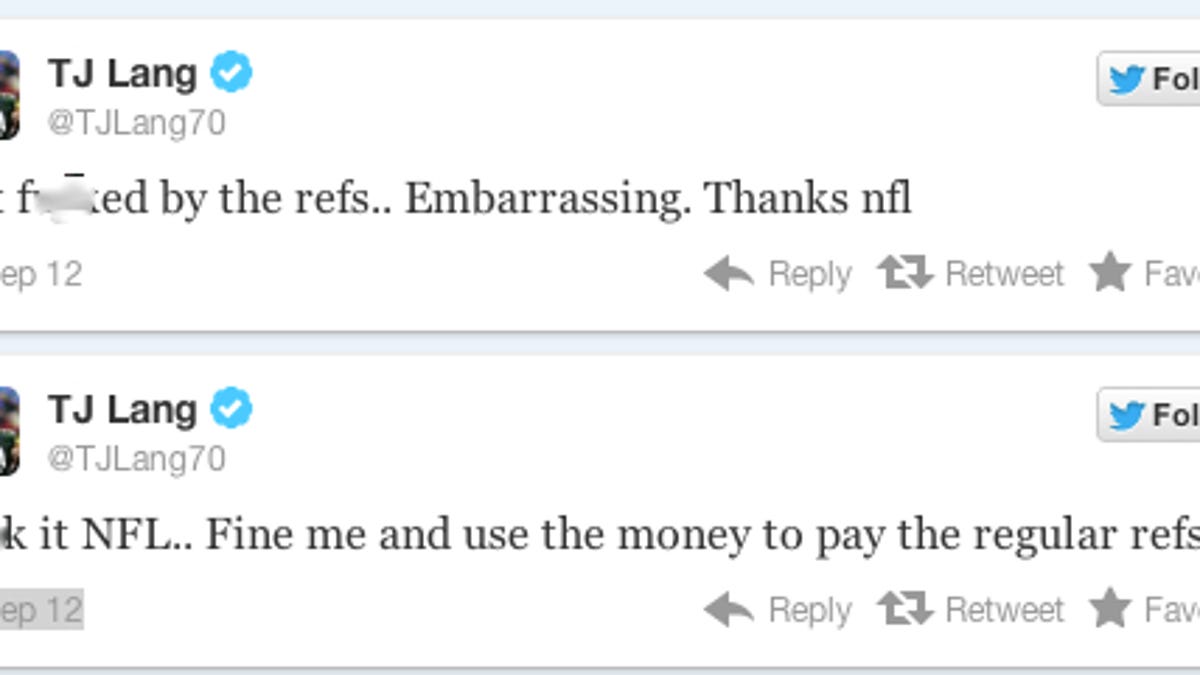Twitter founder says influence is in retweets. NFL player shows why
Evan Williams said that the most interesting measure of Twitter influence is how often someone is re-tweeted. NFL guard TJ Lang's profanity-laced tweets last night illustrated the point.

When Green Bay Packers guard TJ Lang let loose a couple of F-bomb-laden tweets last night in the wake of the Monday Night Football refereeing disaster that cost his team a victory, his posts were quickly seen by far more people than followed him on Twitter.
Lang's two tweets, one which read "Got f---ed by the refs.. Embarrassing. Thanks nfl," and the other, "F--k it NFL. Fine me and use the money to pay the regular refs," were pure frustration at having lost the game to the Seattle Seahawks, likely due to a missed call by referees standing in for locked out NFL officials. And, as CNET blogger Chris Matyszczyk wrote, Lang was hardly alone among NFL players in expressing his feelings on the situation.
But the wide dissemination of Lang's two tweets also illustrated a sentiment that Twitter co-founder Evan Williams had uttered earlier yesterday, suggesting during an interview in New York that how many people follow someone on Twitter is a far less interesting number than how many retweet their posts. "'The thing I think would be more interesting than followers is...retweets,'" Buzzfeed quoted Williams as saying, "clarifying that a simple measure of followers 'doesn't capture your distribution... The dream metric... is how many people saw your tweet.'"
Lang's case sums up Williams' argument perfectly. Before the game against the Seahawks, Lang had 46,725 followers on Twitter. But according to a Twitter blog post today, his two tweets together got more than 150,000 retweets, suggesting that, indeed, the NFL player's words reached many more people than were following him previously. For one evening, Lang's words became part of the zeitgeist, making him temporarily one of the most influential people on Twitter.
By this afternoon, Lang's follower count had ballooned to more than 103,000, but to parse Williams' thoughts on the subject, it doesn't matter that Lang now has a six-figure following if what he tweets when referee-gate subsides doesn't get much notice. After all, a representative tweet from Lang on September 16, "Been nice having the weekend off.. Haven't watched this much football since high school!" most likely didn't generate any buzz. Nor did this one from September 22: "I see my EMU eagles are giving MSU a little trouble in the first half! Go eagles!"
But by using a little profanity to weigh in, from ground zero, on one of the NFL's biggest controversies in years, Lang established himself -- temporarily at least -- as someone worth listening to.
For many people, of course, their follower count far outweighs the number of retweets they'll ever get for their posts. Williams, of course, wasn't suggesting that people will be able to match their follower numbers with retweets. But it did seem that he was issuing the latest salvo in a long-running debate about how best to measure peoples' influence on Twitter. Many ideas have surfaced over the years, including coming up with ratios between followers and tweets, or how many people follow someone and the number of people that person follows, and others.
Williams' idea is perhaps the most stark -- reducing influence down to the question of how someone's thoughts on Twitter echo across the system. Many people will resist this idea, given that follower counts can be a much larger -- and therefore, more validating -- number than how often someone's tweets are reposted. And, of course, Williams didn't offer any specifics about how such a measurement would take into account the variability of someone's influence. There aren't too many @BarackObamas or @LadyGagas, after all.

